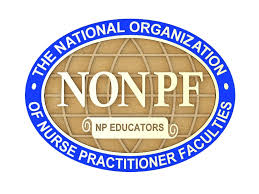Avis Johnson-Smith, DNP, RN, CNS, CPNP-PC, FNP-BC, recently received the 2015 Outstanding Faculty Practice Award by the National Organization of Nurse Practitioner Faculties (NONPF) in recognition of her work with patients and as a clinical professor in the department of nursing at Angelo State University in San Angelo, Texas.
For Dr. Johnson-Smith, who also heads up Angelo State’s online Family Nurse Practitioner graduate program, the NONPF Faculty Practice Award is a reflection on the work she loves to do. As a sole practitioner in Georgia, with her husband, a respiratory therapist, as a partner, Dr. Johnson-Smith keeps busy with the academic and direct caregiving sides of her career.
“I have the best of both worlds,” she says. “I practice and I also teach students so that when they go out into the world they truly understand the practice.” And Dr. Johnson-Smith knew the more information she had, the better she would be able to care for her patients, so she saw getting her doctorate in nursing as a top priority. “I wanted to give the best possible care within the community and look beyond my community and shape other practices and patients,” she says.
Dr. Johnson-Smith says running her own practice is about her work with patients and not being forced to cram patients through a fast-paced environment. She wants to be able to take the time to speak with them and not feel like everyone is on an assembly line of care.
Being able to practice in a clinical environment and teach future nurses offers Dr. Johnson-Smith the chance to bring her real-world experience into the classroom. “I bring back cases I’ve had that [looked like] textbook cases, but were not textbook,” she says. So she can present unusual symptoms or presentations to her students and see what they come up with for a diagnosis.
She also offers students real-life nursing skills. She makes sure they have experience doing the more day-to-day work as well as the clinical skills. Her students have experience with dictating patient histories and physical conditions so when they are required to do that upon a patient’s discharge, for example, it will be familiar. “They will be expected to know that in practice and have that kind of experience,” says Dr. Johnson-Smith, but often new nurses don’t have that kind of skill. Dr. Johnson-Smith didn’t either when she started and that’s why she knows how important it is for new nurses.
Like many other healthcare professionals, Dr. Johnson-Smith first considered nursing a career after her own hospital stay as a child. After toying with the idea of going into ob/gyn or pediatrics, another nurse mentioned the idea of becoming a nurse practitioner. The fit was perfect.
And while Dr. Johnson-Smith says she never intended to become a teacher, she enjoys the process of teaching and the interaction with students. She especially likes hearing from former students who have gone on to establish their own practices or even the ones who are practicing and want her professional opinion. Shes thrilled that former students are comfortable enough to call her and say, “I’m stumped. What do you think I should do?”
Dr. Johnson-Smith says the ever-changing world of nursing is always challenging. “The nurse practitioner role is evolving, even over the last several years and definitely since I started looking at a nurse practitioner role,” she says. One of the biggest challenges for nurses today is to make sure everyone understands what their role is and that’s vital as healthcare moves toward an interdisciplinary approach in many places.
“It’s collaboration,” she says. “We are all looking for the same thing – that our patients and families have the best possible outcome.”
And Dr. Johnson-Smith also appreciates the role she has in her community. “Many times, my husband and I will say at some point this is more of a ministry,” says Dr. Johnson-Smith. “It seems like when we say we aren’t going to do this anymore, a patient comes in, in tears, and says, ‘I knew if I could just make it here and get here everything would be all right.’ It’s not always about what you can do to treat a physical problem.”
- WOC Nurses Week Highlights Specialty - April 16, 2024
- Honoring Radiology Nurses Day on April 12 - April 12, 2024
- Travel Offers New Career Possibilities - April 8, 2024



